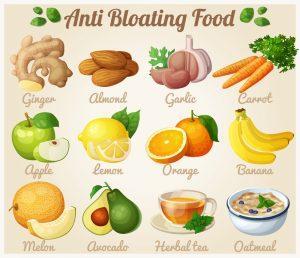
Get Rid Of Stomach Gas & Bloating – Follow 10 Useful Natural Home Remedies

Are you worried of frequent stomach gas passing through rectum, frequent belching of air from your stomach, or bloating of abdomen after eating, which makes you feel uncomfortable and inconvenient? Stomach gas and bloating is a natural occurrence in human body and you can easily alleviate it by letting it out or eat different types of foods. You may also feel bloating and stomach cramps which gives you discomfort. But fortunately, there are various natural ways or home remedies with which you can take the advantage and get relieve from stomach gas.
WHAT ARE THE CAUSES OF STOMACH GAS AND BLOATING?
Gas is a natural process that takes place when the food breaks down into the small intestine. Some foods may produce more gas as compared to others and these foods include lentils, fructose, lactose and sorbitol. Some other causes of stomach gas are excessive stress and swallowing in air while you’re eating.
The excessive stomach gas can also be the sign of some serious health condition such as irritable bowel syndrome (IBS), gastroesophageal reflux disease (GERD), lactose intolerance and celiac disease.
The stomach gas is accompanied by another uncomfortable feeling called as bloating, which is a feeling of fullness or tightness or swelling in the abdomen and it occurs when too much gas built up in stomach. Bloating usually dissipates when the gas is released.
Top 10 natural home remedies to get relieve from stomach gas and bloating:
If you suddenly start experiencing stomach gas then instead to go for medications, you may get rid of it by following these natural home remedies:

CARAWAY:
Caraway, which is also known as Persian Cumin has been served for centuries in releasing the trapped gas from the digestive tract. If you feel getting bloated with gas then simply chew few Caraway seeds right away.
ANISE:
Anise is usually use in the foods as a flavoring agent but it has anti-spasmodic properties (reduces muscular tension) allowing the digestive tract to relax and reduce cramping. Anise also works in reducing stomach gas that results in bloating.
PEPPERMINT:
Peppermint calms the stomach muscles and improves the flow of bile which is necessary for the body to digest fats. Due to this advantage of peppermint, the food can easily and quickly passes through the stomach. It has been observed that peppermint oil helps to reduce stomach gas, abdominal pain and diarrhea.
APPLE CIDER VINEGAR (ACV):
The raw and unprocessed Apple Cider Vinegar contains those enzymes that help in boosting up the digestive system. It is recommended to take one tablespoon of ACV then dilute it in warm water and drink it before having a meal. This allows the alleviation of stomach gas and bloating after the meal.
CINNAMON:
Cinnamon is very popular spice which has been known for its medicinal properties. It contains high levels of antioxidants that are known for their potent anti-inflammatory activity. It also reduces pressure on the abdomen by giving passage to release the stomach gas.
TURMERIC:
Turmeric has been known for its anti-inflammatory properties and it is helpful in relieving the symptoms of indigestion especially excess stomach gas.
CHAMOMILE:
Chamomile has been popular for its relaxing and sedative properties. According to the study, it has been found that Chamomile is useful in reducing stomach gas and cramping while pushing the foods through the intestines. This herb is also helpful in relieving diarrhea, chronic heartburn, upset stomach, nauseas, vomiting, loss of appetite and motion sickness.
GINGER:
Ginger is another natural remedy that relieves a person from various medical conditions such as abdominal pain, stomach gas, dyspepsia (stomach fullness or upset stomach) and nausea.
PROBIOTICS:
Probiotics gives various health benefits including the reduction of stomach gas. It has also been observed that probiotics reduce the symptoms and pain of irritable bowel syndrome (IBS). It is recommended to consult the physician before taking any probiotic.
ACTIVATED CHARCOAL:
According to American Journal of Gastroenterology, activated charcoal is a useful remedy for preventing intestinal gas occurring after eating gas-producing foods. Activated charcoal is available in supplements and make sure to talk to the physician before taking these supplements.
CONTACT GI ENDOSCOPY PRACTICE SPECIALISTS IN NJ:
If these natural home remedies didn’t work for you or the problem of stomach gas and bloating still persists then it is important for you to consult gastroenterologist because it might be the sign of any other serious health problem. The specialists at GI Endoscopy Practice are highly recommended in treating patients with different problems related to digestive tract.
You Might Also Enjoy...


What Is The Natural Treatment For H. Pylori Infection?

A Complete Overview of Hiatal Hernia

Constipation – How To Use The Best 5 Essential Oils?

How The Procedure Of Flexible Sigmoidoscopy Is Performed

